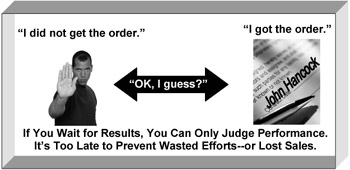Sales Excellence Requires More Than Educated Guesses
For any activity you have excelled at, it is likely that you have been able to measure your progress in real time. Your progress determines what adjustments you need to make to improve your performance. Think about it: In golf, you keep track of strokes on each hole; with diets, the number of pounds lost per week; with school, your grades on tests; with stocks, your monthly return on investment; and the list goes on and on. Selling is no different if you want to excel at it. You must be able to measure your progress in real time as well.
| Note | Most salespeople can explain why they lost sales. Yet, the key to duplicating success is to know why you won sales. Salespeople have a more difficult time explaining wins when they are more a function of persistence and style—or fall under the broad category of relationships—than structure, process, and substance. |
Most selling methods divide the sales process into the following four basic stages:
-
Establishing rapport
-
Qualifying
-
Presenting/closing
-
Postsale support
You cannot use these stages to measure your progress. They are broad descriptions rather than specific events. Each salesperson determines when one stage ends and the next one begins. With ever-changing starting and ending points, salespeople (and their managers) find it difficult to evaluate the progress and potential of opportunities. For example, if you have two sales opportunities that are both in the qualifying stage, does that mean they are both at the same point with the same potential? Absolutely not!
Furthermore, these four stages can not help you to answer your most important question, which is "How did I do in my sales call?" This question lets you measure your progress and crosses your mind every time you conclude discussions with customers. Typical answers to this question usually consist of two after-the-fact responses and one well-intentioned guess.
-
The call went great if you get the order or achieve a predetermined objective.
-
The call went lousy if you let the sale slip away to the competition or the black hole of "maybe next year."
-
The call went okay for everything other than what was "great" or "lousy."
The first two after-the-fact observations leave nothing to the imagination. You know the final score, and you either celebrate a great victory or learn from a lousy defeat. It is the third reply whose outcome remains in doubt—as does your ability to sell value and increased sales. Everything depends on how your undecided "okays" turn out.
Two conclusions jump out at you. First, your okay answers are really guesses. After all, okays in selling are always followed by a silent "I guess" or "I think." Second, uncertainty about your potential for a successful sale means possible wasted efforts and missed opportunities. (See Exhibit 1-5.)

Exhibit 1-5: Prevent wasted effort.
Ask yourself what method you used to determine your answers. They probably range from personal or professional judgments to instincts or gut feelings to experiences or, simply, educated guesses. These replies, even though honed by time, remain subjective. They do not provide a measurable way to gauge and influence your progress. The value of these subjective indicators increases greatly if you use them after taking measurable readings, not before.
| Note | You and customers share a common goal that helps to improve your productivity. They do not want to waste time either. However, your selling methods, which guide their buying framework, also do not let them measure their progress. Without that ability, customers cannot provide an accurate assessment of the potential for achieving their goals in a cost-effective manner. |
EAN: 2147483647
Pages: 170